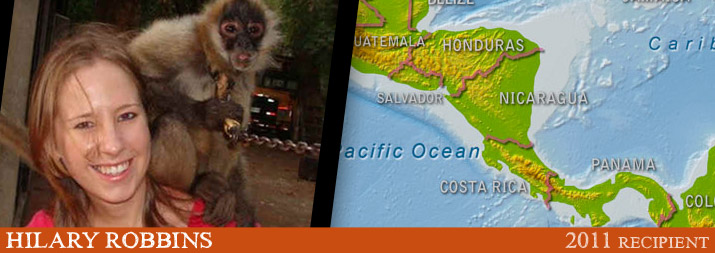
Hilary Robbins is a graduate of Duke University. Hilary spent six months in Nicaragua, performing a research study in an impoverished community to determine health needs, developing a program design for a free clinic, and then applying for monetary grants and medical supply donations to make the clinic a reality. Hilary received a $1500 scholarship from Sara’s Wish Foundation.
Here are Hilary’s travel safety tips:
The following bullet points are pieces of advice that I have about staying safe in Managua and around Nicaragua. Some of them may apply broadly to developing countries, and others may be specific to my experience.
- First, know your site. While I do think it is useful to learn generic travel safety tips if it is your first traveling experience, be aware that most pieces of advice don’t apply everywhere. Make a point to talk extensively with someone who grew up in the area and has high standards of safety about the best way to stay safe.
- Take the time to learn the language as much as possible. Do not go to a new place where you do not speak the language and expect others to take care of you, especially if you are going to be there for an extended period of time. I have found that the better your language skills and knowledge of the area, the less likely you are to become a victim of any sort of crime.
- In Managua, it is usually best to use nicer-looking taxis as opposed to the more dilapidated ones. The number on the license plate should match the number on the side of the taxi, and the driver should have official taxi registration.
- Get contact information for taxi drivers who are known to be safe and reliable, and use them whenever possible.
- Though city buses in Managua don’t always feel safe, the reality is that the drivers know what they’re doing and accidents are quite rare. The real danger is at night, as the robberies sometimes occur on the buses at gunpoint or knifepoint. Riding buses is a fine idea during the day, but something I did not do as a rule at night.
The great part about traveling in Nicaragua is that buses are cheap and run frequently all over the country. The troubling part is that the buses don’t always appear to be in great shape and some roads are much less safe than others. That said, I did not hear of any bus accidents while I was there and I am told they are extremely rare. While I did take public buses around the country quite often, I avoided traveling in or through the mountains as much as possible. During one trip I did this by mistake, and was frightened by the speed at which the bus traveled around corners lacking guardrails of any sort. I also avoided traveling at night, as any road is less safe in the dark.
It almost goes without saying that in Managua, one should not walk with any bags or purses and especially not at night. Many of us are accustomed to talking or texting on our cell phones as we walk, but in Managua it is important to keep your cell phone completely hidden if you are carrying it with you. Whether it is safe to walk at night is very dependent upon the area, but as a rule it is not a good idea to walk alone in the dark anywhere.
Perhaps the most important piece of advice I have for people in similar situations to mine – i.e. traveling as an individual volunteer to work with a new organization – is to have a frank discussion about safety before arriving in the country. Each organization has its own standards of safety, and it is important that your organization agree to uphold your standards before you arrive. For instance, in Managua it is extremely common to ride around in the back of a pickup truck – but Managua is a place where traffic laws are often ignored and accidents occur frequently. The members of my organization, including one American, made a habit of riding in the back of the pickup truck as that was the only vehicle they had to transport everyone. This created an awkward situation, as usually the most “important” people took the seats in the front and I did not want to act presumptuously. However, when I made it clear that I wasn’t comfortable riding in the back of the truck because of safety, the organization made every effort to accommodate this. However, I think it’s best that this sort of understanding occur before a volunteer commits to a long-term stay – not after.